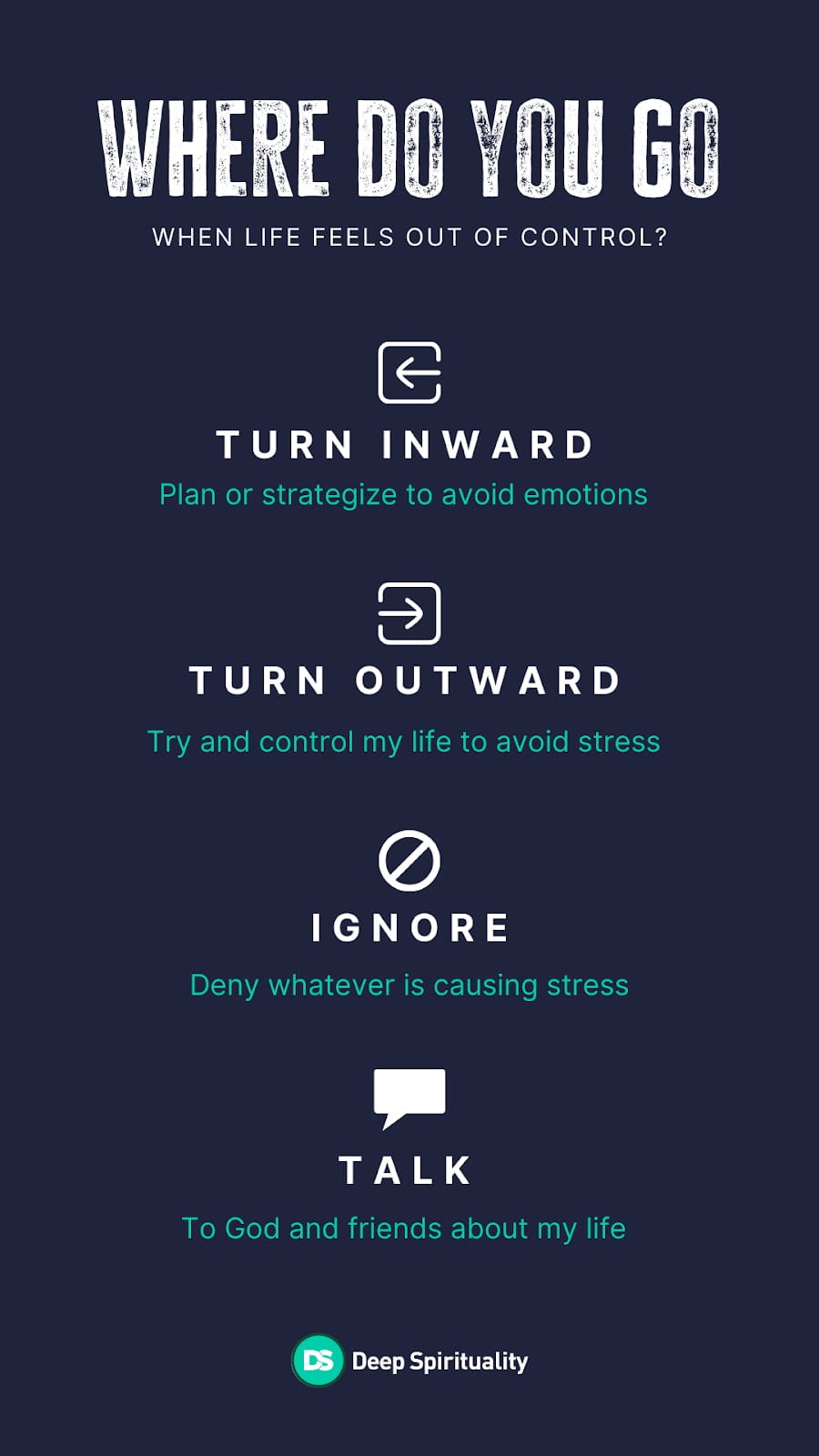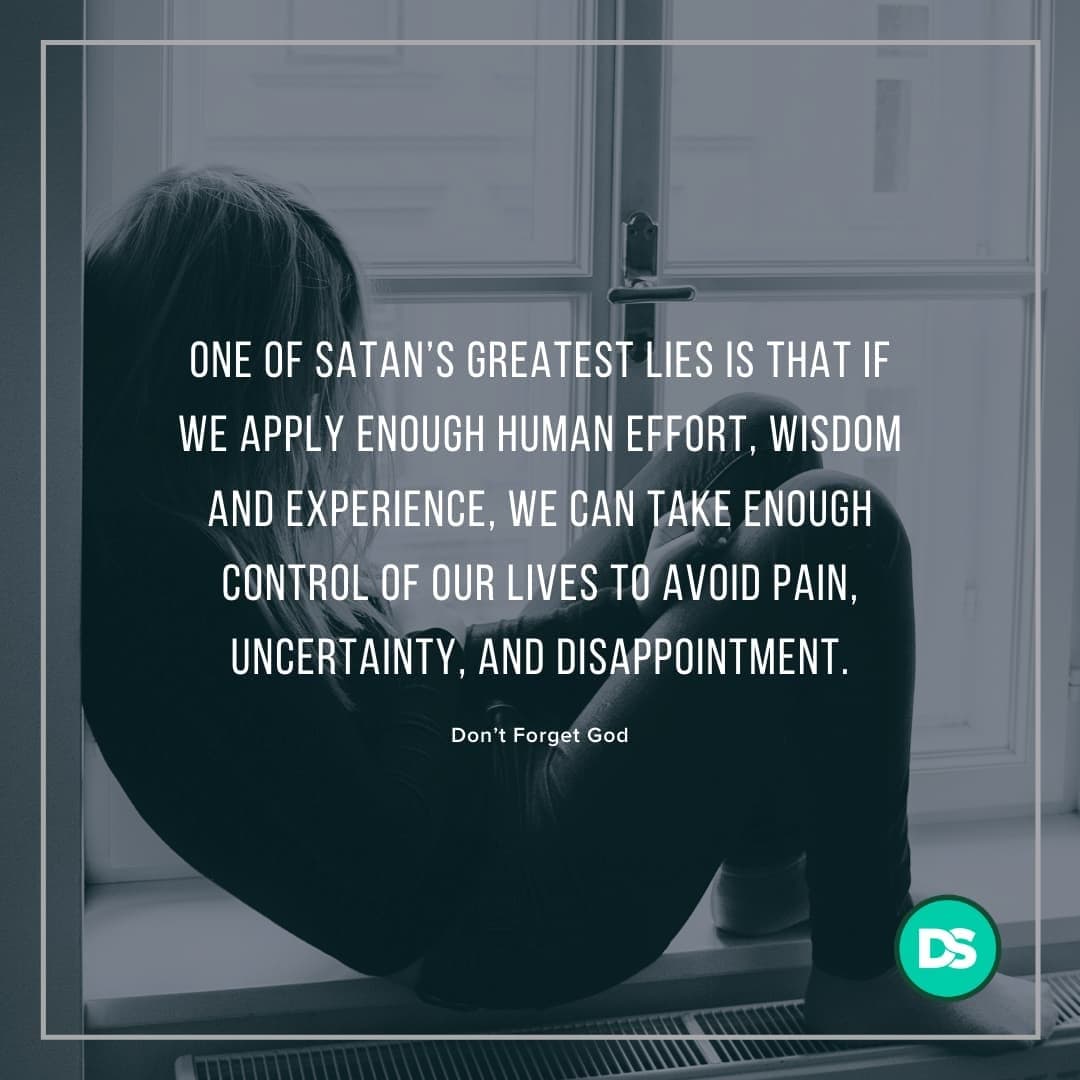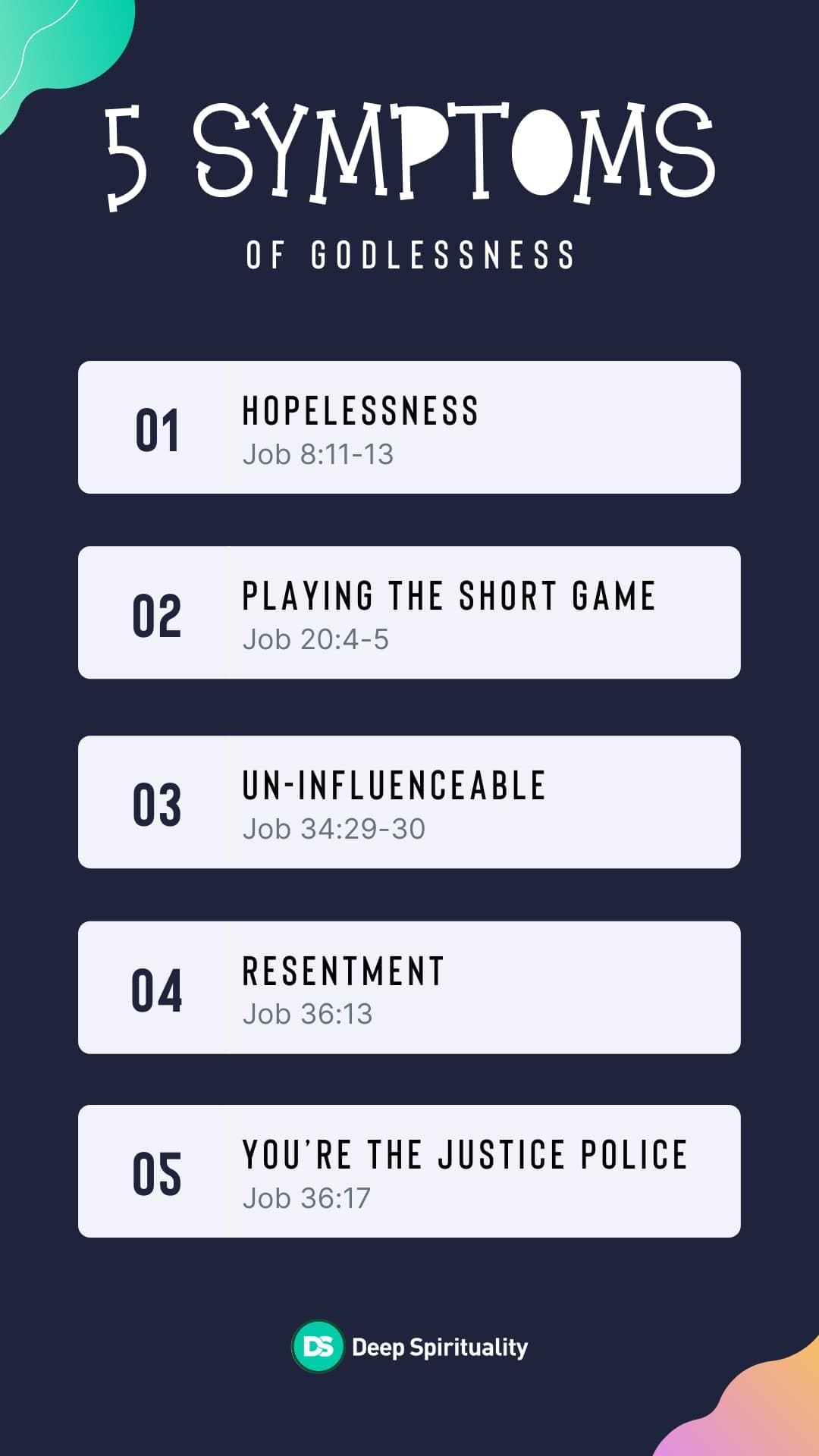So each generation should set its hope anew on God, not forgetting his glorious miracles and obeying his commands.
Psalm 78:7 NLT
It’s tough to get someone who has faith in God to consider the possibility they might also be godless.
It seems like a contradiction by definition. It might help to know we are not talking about a total renunciation of the existence of God.
We are talking about the moments we think, act, respond and make decisions as if God were not real and present in our lives. Moments where our thoughts or focus on God are replaced by people, circumstances, outcomes, or personal desires.
Godlessness is a constant challenge due to how easily I can seek the approval of men over God, or want to be important in the eyes of men rather than God. Many times I’ve made decisions driven primarily by the desire to be liked by people or my peers over pleasing God. Unfortunately, these challenges also have consequences.
Seeking the approval of men produces hiddenness and deceit. The desire to be important leads to fear and insecurity, while the desire to be liked can lead to compromise.
These are common challenges for me, and perhaps you too, that meet the definition of godlessness we are addressing here. Don’t forget it was the religious leaders Jesus was talking about when he said:
These people honor me with their lips, but their hearts are far from me. [9] They worship me in vain; their teachings are merely human rules.
Matthew 15:8-9 NIV
Though these leaders believed in God, their actions were consistent with someone who did not believe in God. They worshiped God in vain, meaning it was futile or ineffectual with no real value and to no end. We all can believe in God and still forget God.
When we do forget God, who do we put our trust in? When we forget God, what do we replace him with?
Forgetting God: When trusting self overcomes our trust in God
When the LORD your God brings you into the land he swore to your fathers, to Abraham, Isaac and Jacob, to give you—a land with large, flourishing cities you did not build, houses filled with all kinds of good things you did not provide, wells you did not dig, and vineyards and olive groves you did not plant—then when you eat and are satisfied, [12] be careful that you do not forget the LORD, who brought you out of Egypt, out of the land of slavery.
Deuteronomy 6:10-12 NIV
From where we sit, it is hard to imagine how the Israelites would somehow forget God after 40 years of seeing miracle after miracle (Exodus 7-17). Yet God was compelled to caution them about forgetting. In the desert, the Israelites had been dependent on God for their existence, including food and protection from the elements and their enemies. There was a daily awareness of their need for God.
In Deuteronomy 6, God is about to fulfill his promise to bring them into a land where many of their needs will already be provided for. This a blessing from God, a fulfillment of a promise that carried with it the risk they would no longer see a daily need for God and would forget him. It is certainly possible to believe in God yet forget about him.
It is certainly possible to believe in God yet forget about him.
Consider the times during the day God is absent from our hearts and minds. Other times, amid difficulty, we give in to fear, distrust, and unbelief as if God were neither willing nor able to help us, leaving us with no option but to trust ourselves. These are godless moments.
One need only look at the daily news cycle to understand that the disturbing, unsettling, disunifying, chaotic, and unjust world we live in is godless. The world is often subject to life-altering events we cannot control.
The daily battle against godlessness is waged in the choice we make for who is in control of our life – God or self. The minute I forget that God has a plan for my life and is in control, I want to toss God out of the picture and fight desperately to take control to avoid pain, uncertainty, stress, and anxiety.
He will appear as your righteousness, as sure as the dawning of a new day. He will manifest as your justice, as sure and strong as the noonday sun. [7] Quiet your heart in his presence and pray; keep hope alive as you long for God to come through for you.
And don’t think for a moment that the wicked in their prosperity are better off than you. [8] Stay away from anger and revenge. Keep envy far from you, for it only leads you into lies. [9] For one day the wicked will be destroyed, but those who trust in the Lord will live safe and sound with blessings overflowing.
Psalm 37:6-9 TPT
We need to recognize when our godlessness drives us to take back control of our life.
Where do you go when life begins to feel out of control?
- “I turn inward by coming up with a plan or a strategy to avoid the flow of information or emotions that are creating stress or anxiety.”
- “I turn outward to control my schedule, conversations, relationships, information, and responsibilities to avoid stress or anxiety.”
- “I ignore, deny or harden to whatever is causing stress, uncertainty, pain, or anxiety. It’s better to be able to function even if I have to do it with a hard heart or numb emotions.”
- “I talk to God, talk to friends, share my thoughts/feelings/emotions, seek input, and read scriptures for guidance on how to think and feel.”

Forgetting God: When religiosity replaces God
Brothers and sisters, join together in following my example. Also, learn by watching those who are living the way we showed you. [18] There are many who live like enemies of the cross of Christ. I have often told you about them. And it makes me cry to tell you about them now. [19] The way they live is leading them to destruction. They have replaced God with their own desires. They do shameful things, and they are proud of what they do. They think only about earthly things.
Philippians 3:17-19 ERV
Another way that godlessness is exposed is when we replace God with something or someone else. One common replacement for God is religiosity.
Religiosity replaces God with moral behavior and performance. God has always made it clear that he looks at what is on the inside – the condition of our heart – while we are enamored by the outward appearance.
But the LORD said to Samuel, “Do not consider his appearance or his height, for I have rejected him. The LORD does not look at the things people look at. People look at the outward appearance, but the LORD looks at the heart.”
1 Samuel 16:7 NIV
The religious leaders in Jesus’ day were impressed by moral behavior and performance.
If you could look and act like a moral religious person, you were honored and admired. This focus on behavior and performance influenced the people around them to value outward appearance in place of God and what God admired.
Woe to you, teachers of the law and Pharisees, you hypocrites! You are like whitewashed tombs, which look beautiful on the outside but on the inside are full of the bones of the dead and everything unclean. [28] In the same way, on the outside, you appear to people as righteous but on the inside, you are full of hypocrisy and wickedness.
Matthew 23:27-28 NIV
There was a natural tension between Jesus and religiosity. Tension will always be active between those like the Pharisees and teachers of the law who value behavior and God who values heart condition.
Reflection questions
- Who are the people you admire and want to imitate? What qualities do you admire about them? Are these internal qualities or outward appearances?
- How much time do you spend praying about the condition of your heart or what you want your heart to become?
- Do you like talking about and exploring what is in your heart or what your heart is attracted to?
When talking to friends, what is most likely to interest you?
- What’s going in their life?
- How they feel about what’s going on in their life?
- The plans they are making in their life?
- The motive behind the plans in their life?
Forgetting God: When humanism replaces God
How foolish can you be? After starting your new lives in the Spirit, why are you now trying to become perfect by your own human effort? [4] Have you experienced so much for nothing? Surely it was not in vain, was it?
Galatians 3:3-4 NLT
Another way godlessness is exposed is when humanism replaces God.
I’m often guilty of this. I naturally want to solve problems, make progress, or influence others through my human wisdom, experience, effort, and strength. It has been an ongoing battle for me to develop the convictions that spirituality or godliness trumps anything I can do through my own efforts.
When humanism replaces God, tension develops between us and the scriptures:
- Do you lack the desire to read the Bible?
- Do you have a hard time agreeing with scripture?
- Do you rely more on your experiences and insights to help guide people?
- Are you more confident in and rely on what you can touch, hear, feel, see or experience than what God is telling us through his word?
These might be indicators of humanism replacing God.
For physical training is of some value, but godliness has value for all things, holding promise for both this present life and the life to come.
1 Timothy 4:8 NIV
This scripture shows us that godliness will help every area of our life. If we do not pursue godliness, we will by nature become humanistic.
When we become humanistic, we navigate life using human wisdom, effort, strength, and experience. One of Satan’s greatest lies is that if we apply enough human effort, wisdom and experience, we can take enough control of our lives to avoid pain, uncertainty, and disappointment.

Our lives were meant to be guided by spirituality and not human experience, wisdom, or emotions. Life requires spiritual perspective and spiritual insight to maintain internal peace.
Reflection questions:
- How often while praying do you find yourself solving a problem in your head instead of asking God for wisdom and insight?
- In a crisis do you naturally begin to take action first before you pray?
- How much does anxiety drive you to take control of your schedule, avoid certain people, keep you from being flexible and make you short or easily angered?
Godlessness is not a characteristic unique to unbelievers.
Here are 5 symptoms of godlessness that might surprise you

Hopelessness
Can papyrus grow tall where there is no marsh? Can reeds thrive without water? [12] While still growing and uncut, they wither more quickly than grass. [13] Such is the destiny of all who forget God; so perishes the hope of the godless.
Job 8:11-13 NIV
Hopelessness is one of the most challenging emotions we can experience, often preceded by heartache, disappointment, unfulfilled expectations, or loss. These events can also hurt our faith.
When our faith takes enough hits without time to be strengthened again, we can lose our ability to see God working in our lives. We are most vulnerable to becoming godless in these moments and begin to take back control of our lives, forgetting God.
When we forget God, the hope we desperately want and need will elude us.
Playing the short game
Don’t you realize that ever since man was first placed upon the earth, [5] the triumph of the wicked has been short-lived, and the joy of the godless but for a moment?
Job 20:4-5 TLB
This one really hits home for me. I struggle greatly when life seems unfair.
This is particularly strong when I see people taking shortcuts in life, getting away with it, and seemingly thriving. I get angry and regret not taking the same shortcuts.
It’s in these moments I’ve lost sight of God’s promises and the importance of playing the long game, understanding the value of being righteous in God’s eyes by trusting his timing and plan.
Un-influenceable
But if he remains silent, who can condemn him? If he hides his face, who can see him? Yet he is over individual and nation alike, [30] to keep the godless from ruling, from laying snares for the people.
Job 34:29-30 NIV
God doesn’t want the godless to lead. Why?
The godless make everything about themselves.
They want their voice, opinions, and ideas to dominate the voices, opinions, and ideas of those around them. When we want our voice and our way to be the dominant voice or opinion, we make it impossible for God to influence us.
We will not listen to people God puts in our life nor will we reflect on our circumstances, challenges, or conflicts to ask what God is trying to teach us.
Resentment
“The godless in heart harbor resentment; even when he fetters them, they do not cry for help.
Job 36:13 NIV
Resentment is a feeling of indignant displeasure or persistent ill will at something regarded as a wrong, insult, or injury (Merriam-Webster).
I have found myself resentful towards God when he is trying to mold and shape or correct and direct my life where I can be used to my greatest potential. I quickly become godless by taking my focus off of God and how he’s working in my life and making my focus how I look and feel.
I have often thought about how hard it must be for God to encourage someone like me to grow. Growth can only take place when I’m willing to admit I have not finished growing.
You’re the Justice Police
But you are obsessed with whether the godless will be judged. Don’t worry, judgment and justice will be upheld.
Job 36:17 NLT
I have a strong desire to see justice done when I’m not the one being judged.
I’m guilty of scrolling through news headlines for articles that agree with my way of thinking while taking pleasure in articles that expose the greatest flaws and failures of other people (as well as their causes and opinions that don’t agree with mine.
My emotions are often tied to whether I am happy with the outcome. I lose sight that judgment and justice are God’s to decide and not mine. These are godless moments where I fail to acknowledge God is real and in control.
We all have moments in our lives we can forget God, moments we think and act as if God were not real or present in our lives. Acknowledging this to ourselves and others is one of the greatest antidotes to forgetting God.
Equally important are the honest conversations with one another about the people, circumstances, desires,or potential outcomes that occupy our thoughts attempting to push God out. These honest conversations are crucial for helping us remember God, especially when life gets hard.




